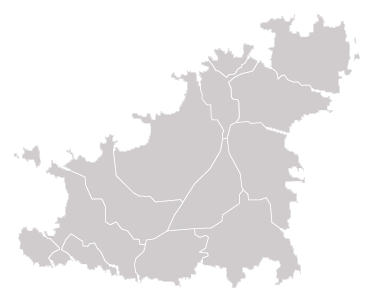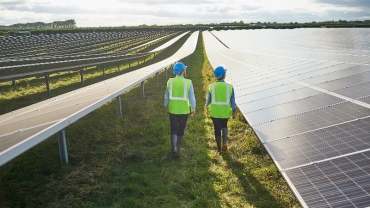
About the Green Jobs Barometer
We hear more and more about the transition to a green economy. But is it really happening in the Channel Islands? If so, how fast compared to London and other parts of the UK? What does the transition mean in practice for employers and employees in the Channel Islands?
The PwC Green Jobs Barometer for the Channel Islands aims to answer these questions. The report tracks the impact of the green transition on job creation, the wider employment benefits, potential job losses and the carbon intensity of work. Drawing on a survey of a thousand Channel Islanders, the research also gauges workers’ perceptions of how the transition will affect their job prospects and working lives.
The results provide valuable insights into the Channel Islands’ preparedness for the transition, how this compares to regions of the UK and how businesses and governments can capitalise on the opportunities to create quality jobs and deliver a fair transition.

Guernsey

Jersey
Taste of what’s to come
Digital transformation offers a foretaste of how the move to a greener economy could affect employment.
Career paths that didn’t exist 20 years ago have become commonplace, from robotics engineer to social media manager. Yet some businesses and workers have lost out – the closure of shops as ever more retail business moves online is a case in point.
Even in the jobs that have endured, there have been shifts in how employees engage, communicate and make decisions. These changes have had a profound impact on how people work and the skills they require.
Virtual briefing
Launching the PwC Green Job Barometer for the Channel Islands in July 2022
Ready to respond
As we gear up for a comparable green transition, businesses and policymakers across our islands need a clear understanding of its implications and how to be on the front foot in response.
In this report, we’ve taken PwC’s Green Jobs Barometer for the UK as the starting point for a Channel Islands-focused version. The report defines what green jobs look like in the Channel Islands, before going on to gauge the potential for green job creation, both directly and as part of a ‘multiplier’ effect on employment across the supply chain. We’ve also estimated the potential scale of ‘sunset’ jobs at risk of being lost. The spotlight on jobs at risk will help businesses and governments move early to reskill affected workers and open up alternative career paths. Drawing on a survey of a thousand Channel Islanders, the research goes on to analyse workers’ perceptions of how the transition will affect their job prospects and working lives.
The Barometer pulls these insights into a composite index score out of 100, comprising five pillars of the green economy. By weighing up the gains and losses, the Barometer not only aims to strengthen readiness, but also make sure that the impact of the transition is balanced and fair.
Untapped potential
So, what do the results tell us? Overall, the Green Jobs Barometer scores for Jersey (45/100) and Guernsey (39/100) are broadly in line with the UK average (43/100). It’s therefore clear that the green transition is already gathering pace in both the Guernsey and Jersey economies.
However, when we consider that London, which is another knowledge-based financial services hub, has a score of 60/100, it is clear there is further progress that could be made in the islands.
How do the Channel Islands compare to UK regions?
How the Green Jobs Barometer is calculated
The Barometer is made up of five pillars:
| Pillar one | Pillar two | Pillar three | Pillar four | Pillar five |
|---|---|---|---|---|
| Green job creation | Wider benefits from green jobs | Sunset jobs to disappear and jobs created | Carbon intensity of jobs | Green workplaces |
| The proportion of job advertisements that are green. | The multiplier effect of new green jobs in creating additional employment. | The distribution of jobs lost as a result of the green transition. | Carbon dioxide emissions per employee. | Workers’ views on how well their employers are helping their role and workplace to become green. |
Source: PwC Green Jobs Barometer Research 2022
How the Channel Islands compare across the five Green Jobs Barometer pillars

Source: PwC Green Jobs Barometer Research UK 2021 and PwC Channel Islands Green Jobs Barometer 2022
The way forward
The clear takeaway from the Green Jobs Barometer is that the Channel Islands need to move further and faster to make the most of the opportunities and manage the risks of green transition.
From understanding the impact on organisations to proactively developing the necessary skills and capitalising on the opportunities, now is the time to turn purpose and ambition into action. If we don’t, we won’t have the time to respond effectively and could therefore lose out to the economies we compete with for business and investment. Taking action now will also enable businesses to stay ahead of the rapidly developing regulatory agenda in this area.
How governments can make a difference
- Lead by example
- Improve labour market insights and monitoring of green jobs
- Factor carbon intensity of employment into decision making about the future economy
- Foster a business environment that supports green sectors and harnesses green job creation
- Create incentives (or regulations) for greener workplaces
- Promote greener ways of working and commuting
- Drive skills initiatives to develop green skills within both the existing and future workforce
How businesses and industry bodies can make a difference
- Move now to green your business before mandatory requirements come into effect
- Develop a clear green strategy and communicate this to stakeholders and employees
- Accelerate training and incentives for greener ways of working (and travelling)
- Take a strategic view on how different services, jobs and skills will need to pivot in the green economy, and what this means for your operational business model
- Create career pathways towards green jobs and roles
- Deliver training to staff to support business change and adopt new greener ways of working
- Accelerate industry collaboration and partnership with government
Giving your business the edge
Examples of green job roles and associated skills
The following chart provides examples of the skills needed by different workers so they can move into green employment.
Medium to high skilled occupations |
||
|---|---|---|
Analytics To interpret change and the measures required |
Project management To coordinate economic, social and ecological objectives |
Innovation To respond to green challenges |
Marketing To promote green products and services |
Consulting mindset To advise on green solutions and green technology |
The right incentives To secure workforce buy-in and drive change |
Across all jobs |
||
Environmental awareness Willingness to learn about sustainable development |
Agility To apply the new technology and processes needed to ‘green’ their jobs |
Teamwork To tackle organisation-wide environmental footprint |
Resilience To respond to and execute change |
Communication To promote change |
Entrepreneurship To seize low carbon and environmental opportunities |
Next steps
If you would like to discuss any of the issues in this report or find out how we can help your organisation harness the opportunities and manage the risks associated with the green transition, please get in touch.
Acknowledgements
Contact us


















